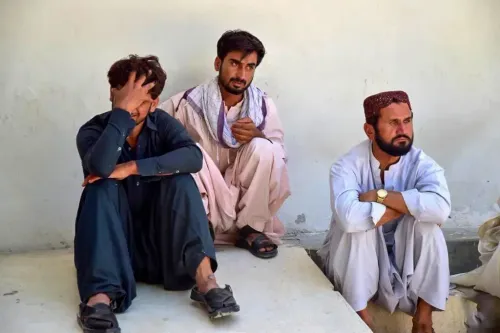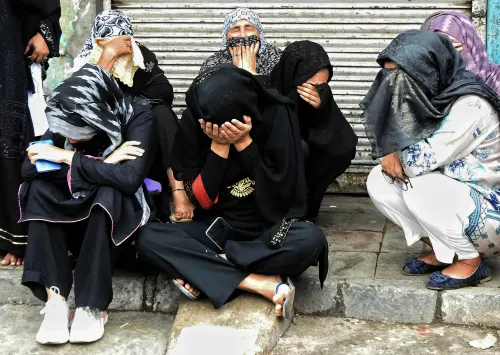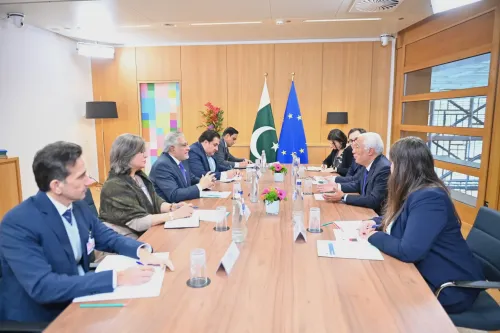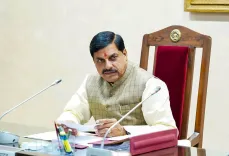The Third Eye: President Trump Commences His Second Term with Anticipated Actions
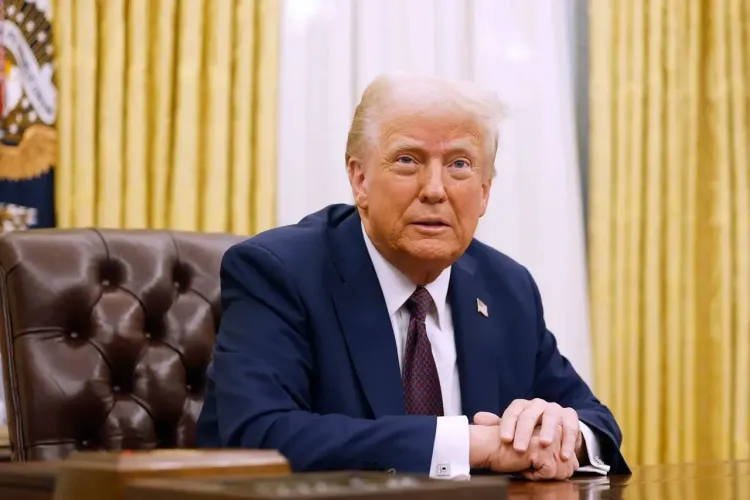
Synopsis
Key Takeaways
- Trump's directives emphasize the 'America First' agenda.
- Immigration policies have been significantly tightened.
- Economic strategies prioritize American interests.
- Foreign policy shifts include withdrawal from international agreements.
- The administration is focused on enhancing government efficiency.
New Delhi, Jan 26 (NationPress) The flurry of directives issued by President Donald Trump shortly after his inauguration was, as expected, clear, assertive, and of significant geopolitical importance. They confirmed that the new US President was resolutely committed to taking full control of governance, implementing the 'America First' agenda, and prioritizing the enhancement of the US economy to meet that objective.
The first of the ten executive orders he signed, even before stepping into the Oval Office, halted 78 notifications from the Biden Administration. His directives included a freeze on hiring federal employees, except for military, immigration control, national security, and public safety, as well as a cessation of new notifications from federal officials and the restoration of full freedom of speech, effectively ending the previous administration's 'weaponization' of governance.
Additionally, Trump declared a withdrawal from the Paris Climate Accord, aiming to conserve the annual $3 billion American contribution to the climate fund. This move, along with the exit from the WHO, which would cut the UN agency's annual US funding of $130 million, is likely to have global ramifications. Trump's longstanding disdain for the WHO stems from his belief that it was under Chinese influence, which he holds responsible for the Covid-19 outbreak, and that the organization mishandled the pandemic.
Trump’s mission of 'Making America Great Again' appears to be the driving force behind many of these initial announcements, encompassing foreign policy, domestic inflation management, unemployment, economic strategies, and trade. In his second term, Trump is motivated by a desire to revolutionize the US and craft a legacy of decision-making that will stand unmatched by any other President.
His initial directives spanned issues from border security to consolidating governance under presidential authority. He ended remote working arrangements for federal employees, mandating their return to in-person roles, and called for a plan to downsize the federal workforce through efficiency enhancements and attrition.
Simultaneously, Trump instructed executive departments and agencies to implement 'emergency price relief measures' aimed at reducing housing, healthcare, food, and fuel costs while also generating employment opportunities.
In a remarkable executive order, President Trump renamed the US Digital Service to the Department of Government Efficiency (DOGE) and proposed placing it under Elon Musk's leadership to maximize governmental efficiency and productivity. He charged his Secretary of State, Marco Rubio, with executing the 'America First' foreign policy, prioritizing the interests of the US and its citizens.
He ordered the renaming of the Gulf of Mexico to the Gulf of America and restored the name of Denali, North America's highest peak, back to its original name, formerly Mount McKinley, named after the 25th President of the US in the 19th century. Domestically, the new President has called for stricter immigration laws, with a directive titled 'Protecting the American People Against Invasion', introducing numerous policies to curb immigration.
Trump declared a 'national emergency' to address immigration issues and tasked military personnel with securing the southern border through additional physical barriers and drones. The Homeland Security Secretary has been directed to set up Homeland Security Task Forces in all states to assist in effectively enforcing immigration laws.
Moreover, Trump has ended birthright citizenship for children born in the US to undocumented immigrant parents and those who entered the country temporarily. He warned of mass deportations for illegal migrants, including those whose birthright citizenship was annulled.
President Trump categorized certain drug cartels as 'foreign terrorist organizations', citing their involvement in violence and crime across the hemisphere, posing a security threat to the US. This designation could facilitate military operations against targets in Mexico and elsewhere. Trump's focus on countering terrorism is likely to resonate positively with India.
Through an executive order, the new President has imposed restrictions on visa applicants from specific countries to safeguard the US from potential foreign threats. Enhanced vetting and screening will be instituted for visa seekers from 'regions and nations with identified security risks'.
Trump reinstated the death penalty, emphasizing 'public safety', and instructed the Attorney General to pursue capital punishment cases for all serious crimes. Additionally, he labeled the Diversity, Equity, and Inclusion (DEI) programs initiated by the Biden Administration as 'radical' and 'wasteful', asserting that merit and skill should take precedence in hiring practices. He rescinded a Biden executive order that allowed the presidency to hire and dismiss federal civil servants based on loyalty, mandating that employees faithfully implement the administration's policies in accordance with their constitutional oath.
Trump has shown no inclination to entertain the rhetoric of liberal values and has firmly rejected 'gender identity politics' and previous diversity regulations, opting instead for a policy framework that recognizes only two sexes—male and female. Consequently, the federal government will now use the term 'sex' rather than 'gender'.
In alignment with the 'America First' doctrine, Trump has declared a 'National Energy Emergency', calling for a review of all legal barriers impeding domestic energy infrastructure creation, such as the Endangered Species Act. He has paused all federal wind energy projects, dismissed the notion of renewable energy, and endorsed the revival of the oil and natural gas sectors. Notably, Trump has also introduced the 'America First Trade Policy', advocating for an immediate reassessment of 'unfair and unbalanced trade' with all nations, including China.
Several orders enacted by President Trump appear to be personally advantageous. As anticipated, he granted pardons and commutations for offenses related to the events surrounding the US Capitol on January 6, 2021. He also ordered the dismissal of all outstanding indictments related to that day, encompassing over 1,500 defendants, alleging political vendetta behind these cases.
Trump ordered flags to be flown at full mast on Presidential inauguration days, overturning the Biden Administration's directive for a month-long mourning period for former President Jimmy Carter that would have coincided with Trump's swearing-in.
The Trump directive to allow the popular China-owned TikTok to operate temporarily was intended to stall the enforcement of a law that had mandated the shutdown of the social media platform due to national security concerns—unless sold to an American entity—and set January 19 as the deadline for compliance. Trump expressed openness to Elon Musk, CEO of Tesla, acquiring TikTok—an opportunity that could benefit Musk's business and provide substantial political backing for the new President.
Targeting the Deep State, Trump signed an order terminating the 'weaponization of government' against political adversaries and instructed the Attorney General to investigate the perceived misuse of the Department of Justice, Securities and Exchange Commission (SEC), and Federal Trade Commission (FTC) by the Biden administration. Reports suggest that the US Supreme Court currently has a majority of conservative justices, who have recently ruled that presidents enjoy broad immunity from prosecution for official actions taken during their tenure, providing a reassuring backdrop for Trump.
The policy framework of President Donald Trump is still taking shape, but the invocation of 'America First' has already manifested in foreign policy, trade tariffs, and national security strategies he has defined. He is vocal about his intention to transform the country’s systems to 'Make America Great Again'.
India is likely to align with President Trump concerning global terrorism and its faith-based origins, leading the new President to call for heightened scrutiny of visa applicants from specific nations and regions.
Trump is cautious about projecting American political or military strength as a superpower, with a clear focus on growth through economic advancement. Nevertheless, he has referenced China multiple times in an adversarial context, specifically regarding 'trade imbalances' with all nations. He has explicitly blamed China for dominating the WHO and for causing the COVID-19 pandemic. In his inaugural address, he justified the US decision to 'take back' the Panama Canal, claiming China was gaining an unfair strategic advantage.
Beyond Trump's stance against global terrorism, his approach to China is likely to strengthen Indo-US relations. He seems to dismiss human rights campaigns on social media while advocating for a peaceful global order. His previous rapport with President Putin of Russia, along with his lack of enthusiasm for the European Union and strong support for Israel against Hamas' violence, might moderate the Ukraine-Russia conflict while assisting in the hostage release process by both Hamas and Israel.
India should adopt a cautious stance toward the 'America First' initiative and Trump's policies on tariffs, immigration, and border security, especially following his assertion that 'we will forge a society that is color blind and merit-based.' As a major player in a multipolar world order, India advocates for global peace, fairness in international trade, and bilateral relations based on mutual security and economic interests, which can facilitate its dealings with Trump's presidency on merit as well.
(The writer is a former Director of the Intelligence Bureau)

